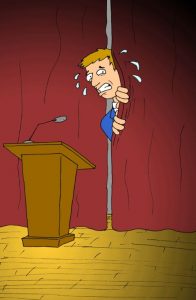Shyness or social phobia?
 Shyness is a dimension of personality that isn’t certainly pathological in itself, it characterizes all individuals, with quantitative differences.
Shyness is a dimension of personality that isn’t certainly pathological in itself, it characterizes all individuals, with quantitative differences.
Many data tell us that fear of public speaking is one of the most popular fears, as it is very common that unpleasant feeling of discomfort that you can experience being at a party where you do not know the other guests.
But when does shyness turn into pathology? When does the discomfort become social phobia?
When this anxiety for social interactions and exposure assumes such intensity that compromises work and social adjustment or when it creates a significant subjective distress. This can happen when, for example, people are no longer able to attend the workplace because of social anxiety, or when, despite continuing to do so, the phobia causes a waste of physical and emotional energy that is so high that it compromises significantly the quality of life.
A few definitions …
In the DSM IV-TR social phobia is defined as the marked and persistent fear of one or more social or performance situations in which the person is exposed to unfamiliar people or to possible scrutiny by others, for fear of showing anxiety symptoms or to act in a way that will be awkward, embarrassing or humiliating.
Two subtypes are distinguished:
generalized form: the most pervasive one, that is, when the anxiety is present in most of the situations in which exposure to others is involved
not generalized form (or limited): in which the person develops anxiety in one or two situations to the maximum, usually of performance, such as speaking or eating in public
The most often feared situations are the following:
- Public speaking
- Eating or drinking in public places
- Working when observed
- Performing at oral exams
- Calling
- In general, being the center of attention
What are the most common deep psychological experiences often found in those who suffer from social phobia?
- Preoccupation over critics
- Fear of exposing themselves and be seen
- Fear of failure
- Fear to experience emotions in public
- Widespread sensation of inadequacy
- Feeling of inadequacy
- Fear of judgment
Complications …
Scientific studies have shown that, in some cases, social phobia can cause further disorders which sometimes may even become disabling. One person can develop, for example, alcohol abuse or abuse of other psychotropic substances, which are often used by people who suffer from social phobia as “self-medication“, that is, with the aim to mitigate and treat anxiety symptoms, but it often results in worsening their psychological state. In some situations, social phobia can lead the individual to a severe social withdrawal and, in some cases, to depression.
How to recover from social phobia?
It is possible to intervene on this disorder either with a pharmacological or a psychotherapeutic treatment.
Scientific evidence demonstrates the superiority of a combined treatment (psychotherapy associated with medication) in the cure of this disorder.
If you think that you are suffering from social phobia contact one of our professionals specialist in anxiety disorders also available for TREATMENTS AT THE HOUSE OF THE PATIENT also in English and Spanish.
**********************************************
Psychiatrist Licia Lietti: +39 338 5019524 (italian and english)
Clinical psychologist Martina Trinchieri: +39 393 5564912, martinatrinchieri90@gmail.com
Clinical psychologist Martina Larsen Paya: +39 349 1696270, martinalarsenpaya@gmail.com
http://larsen-paya-psicologa.com/
Psychotherapist Marcello Florita: click here to see the website, +39 348 795 5929
**********************************************



